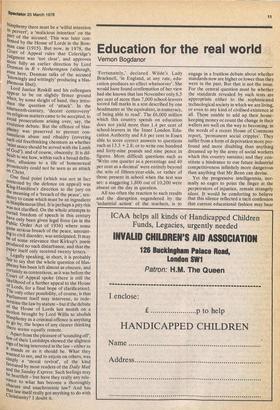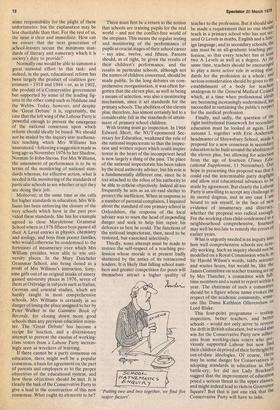Education for the real world
Vernon Bogdanor
'Fortunately,' declared Wilde's Lady Bracknell, 'in England, at any rate, education produces no effect whatsoever'. She would have found confirmation of her view had she known that last November only 6.5 per cent of more than 7,000 school-leavers scored full marks in a test described by one headmaster as 'the equivalent, in numeracy, of being able to read'. The £6,000 million which this country spends on education does not yield more than 1.4 per cent of school-leavers in the Inner London Education Authority and 8.6 per cent in Essex able to score correct answers to questions such as 13.3 + 2.8; or to write one hundred and forty-nine pounds and nine pence in figures. More difficult questions such as 'Write one quarter as a percentage and 40 per cent as a decimal' were entirely beyond the wits of fifteen-year-olds, or rather of those present in school when the test was set: a staggering 1,800 out of 10,200 were absent on the day in question.
All too often the reaction to such results and the disruption engendered by the 'industrial action' of the teachers, is to engage in a fruitless debate about whether standards now are higher or lower than they were in the past. But that is not the issue. For the central question must be whether the standards revealed by such tests are appropriate either to the sophisticated technological society in which we are living, or even to any kind of civilised existence at all. Those unable to add up their housekeeping money or count the change in their wallets are well on the way to becoming, in the words of a recent House of Commons report, 'permanent social cripples'. They suffer from a form of deprivation more profound and more disabling than anything dreamed up by the army of social workers which this country sustains; and they constitute a hindrance to our future industrial competitiveness infinitely more dangerous than anything that Mr Benn can devise.
Yet the progressive intelligentsia, normally so eager to point the finger at the perpetrators of injustice, remain strangely silent. It would be comforting to believe that this silence reflected a tacit confession that current educational fashion may bear some responsibility for the plight of these unfortunates: but the explanation may be less charitable than that. For the rest of us, the issue is clear and immediate. How can we ensure that the next generation of school-leavers secure the minimum standards of literacy and numeracy which it is society's duty to provide?
Normally one would be able to summon a great national effort to this task: and indeed, in the past, educational reform has been largely the product of coalition government —1918 and 1944 — or, as in 1902, the product of a Conservative government but supported by some of the leading figures in the other camp such as Haldane and the Webbs. Today, however, and despite the 'Great Debate' it is, regrettably, the case that the left wing of the Labour Party is powerful enough to prevent the emergence , of the national consensus upon which reform should ideally be based. We should not be misled by the inquiry into mathematics teaching which Mrs Williams has announced —following a suggestion made as long ago as November 1976 by her Shadow, Norman St John-Stevas. For Mrs Williams, the assessment of performance is to be in terms of the monitoring of national standards whereas, for effective action, what is needed is the monitoring of the standards of particular schools to see whether or not they are doing their job.
Moreover, at the same time as she calls for higher standards in education, Mrs Williams has been enforcing the closure of the very schools which have in the past provided these standards. She has for example agreed to close Marylebone Grammar School where in 1976 fifteen boys passed all their A Level entries in physics, chemistry and zoology, and boys from poorer families, who would otherwise be condemned to the fortresses of innumeracy over which Mrs William presides, were able to win university places. In the Mary Datchelor Grammar School, also being closed as a result of Mrs Williams's instruction, fortynine girls out of an original intake of ninety gained university places in 1976, seven of them at Oxbridge in subjects such as Italian, German and oriental studies, which are hardly taught in most comprehensive schools. Mrs Williams is certainly in no danger of losing the place assigned to her by Peter Walker in the Guinness Book of Records, for closing down more good schools than any previous education minister. The 'Great Debate' has become a recipe for inaction, and a diversionary attempt to prevent the exodus of workingclass voters from a Labour Party increasingly seen as wreckers of learning.
If there cannot be a party consensus on education, there might well be a popular consensus, a basis for agreement on the part of parents and employers as to the proper objectives of the educational system, and how these objectives should be met. It is clearly the task of the Conservative Party to give a lead in the construction of this new consensus. What ought its elements to be? There must first be a return to the notion that schools are training pupils for the real world — and not the conflict-free world of the utopians. This means the regular testing and monitoring of the performance of pupils at crucial stages of their school career — say nine, twelve, and fifteen. Parents should, as of right, be given the results of their children's performance, and the results in particular schools, although not the names of children concerned, should be made public. In the long debates on comprehensive reorganisation, it was often forgotten that the eleven plus, as well as being a means of selection, was also a monitoring mechanism, since it set standards for the primary schools. The abolition of the eleven plus, therefore, has almost certainly led to a considerable fall in the standards of attainment of primary school children.
With testing must go inspection. In 1968 Edward Short, the NUT-sponsored Secretary for Education, weakened the role of the national inspectorate so that the inspection and written report which could inspire terror in the heart of the incompetent head is now largely a thing of the past. The place of the national inspectorate has been taken by the local authority adviser, but his role is a fundamentally different one, since he is too' attached to the ethos of his authority to be able to criticise objectively. Indeed all too frequently he acts as an air-raid shelter to protect the inefficient. When in response to a number of parental complaints, I inquired about the standard of one primary school in Oxfordshire, the response of the local adviser was to warn the head of impending danger and seek to help him repair his defences as best he could. The functions of the national inspectorate, then, need to be restored, but exercised selectively.
Thirdly, some attempt must be made to restore the self-respect of a teaching profession whose morale is at present badly shattered by the antics of its rentacrowd leaders. It is likely that falling school numbers and greater competition for posts will themselves attract a higher quality of
teacher to the profession. But it should also be made a requirement that no one shoulo teach in a primary school who has not see' ured 0 Levels in maths, English and a fOre" ign language; and in secondary schools, the aim must be an all-graduate teaching Pr°fession, so that every teacher has at least two A Levels as well as a degree. At the same time, teachers should be encouraged to play a more active role in setting stan' dards for the profession as a whole; and serious consideration should be given to the establishment of a body for teachers analogous to the General Medical Council which, at a time when professional ideals are becoming increasingly undermined, has succeeded in sustaining the public's respee`, for the medical profession. Finally, and sadly, the question of the right institutional framework for secondary education must be looked at again. Last autumn I, together with Eric Anderson, headmaster of Shrewsbury School, made t3 proposal for a new consensus in secondarY education to be built around the abolition of the eleven plus, but allowing for selection from the age of fourteen (Times Edit. cational Supplement, 11 November). Our hope in presenting this proposal was that it could end the interminable party dogfight and allow real educational advances to be made by agreement. But clearly the Labour Party is unwilling to accept any challenge t° its sacred dogmas, and in any case I arn bound to ask myself, in the face of new evidence of innumeracy and illiteraeY, whether the proposal was radical enough. For the working-class child condemned to a neighbourhood comprehensive, fourteen may well be too late to remedy the errors of earlier years. What is urgently needed is an inquiry int° how well comprehensive schools are actually working. Such an inquiry should not be modelled on a Royal Commission which, in Sir Harold Wilson's words, takes minutes and wastes hours, but would be, like the James Committee on teacher training set LIP by Mrs Thatcher, a committee with full' time members and a remit to report within ti year. The chairman of such a committee should be a figure whose name evokes the respect of the academic community, some' one like Dame Kathleen 011erenshaw or Lord Blake.
This four-point programme — testing, inspection, better teachers, and better schools — would not only serve to reverse the drift in British education, but.would also win for the Conservative Party new adherents from working-class voters who pre; viously supported Labour but now fin" their children deprived of their birthright bY out-of-date ideologies. Of course, there may be some danger for Conservatives in adopting standards in education as their battle-cry; for did not Lady Bracknell suggest that the improvement of education posed a serious threat to the upper classes, and might indeed lead to riots in Grosvenor Square? But that is just one risk that the Conservative Party will have to take.



































 Previous page
Previous page